Everything You Need to Know About FOOD ALLERGIES *Update* (Nutrition Labels, Research & Sesame) with Bob Earl, MPH, RDN
- Why the data for early introduction of peanut, egg and milk is stronger than for other foods
- How sesame “may contains” statements got so confusing…even on foods without sesame
- Which potentially allergenic foods you should offer first…and why
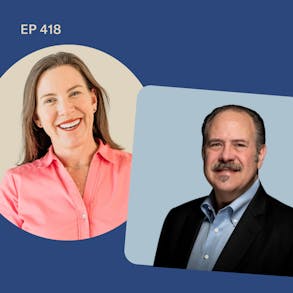
LISTEN TO THIS EPISODE
Episode Description
What causes food allergies and can introducing certain foods early to your baby help prevent food allergy? Food allergy guidance and recommendations seems to be changing quite regularly and figuring out the best way to safely introduce allergenic foods is confusing.
In this episode dietitian Bob Earl from Food Allergy Research and Education (FARE) at foodallergy.org updates us on everything new and notable in food allergies including allergen labeling for the newest allergen on the Top 9 which is sesame.
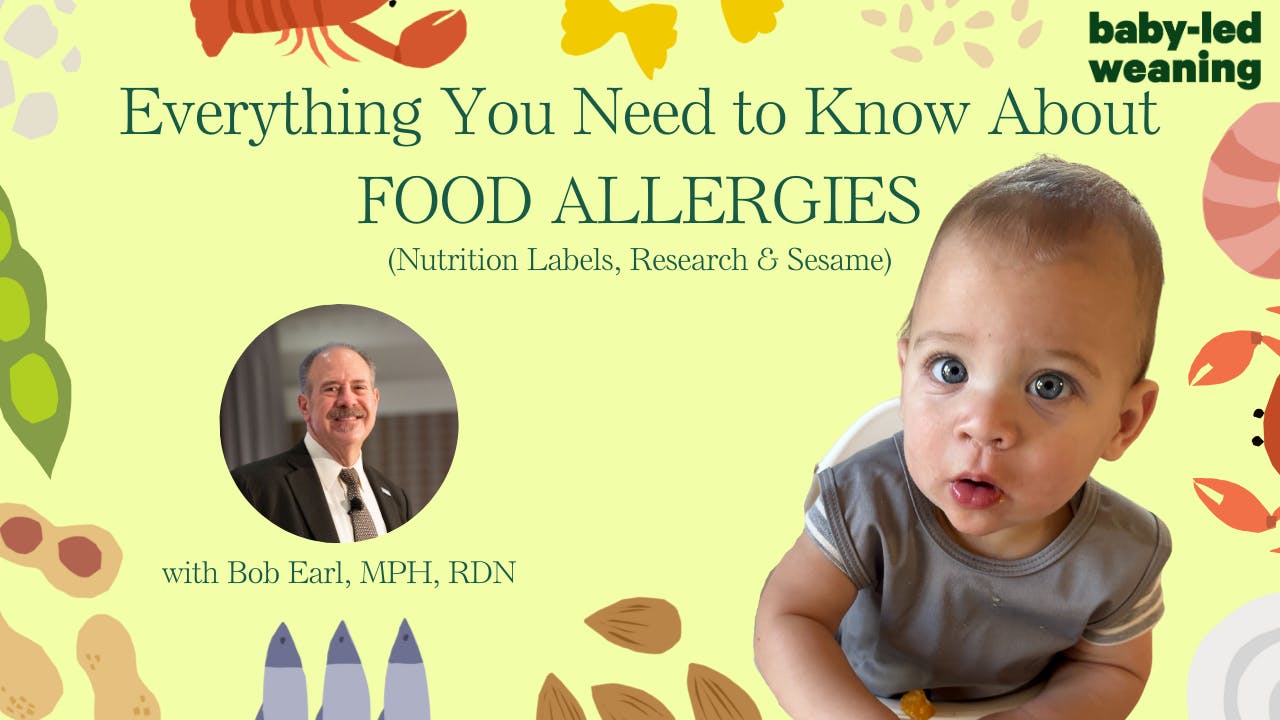
About the Guest
- Bob Fare, MPH, RDN is the Vice President of Regulatory Affairs at Food Allergy Research and Education (FARE)
- Bob works on efforts related to food allergy awareness and labeling, WIC and school meals.
Link from this Episode
- FARE website: https://www.foodallergy.org/
- Baby-Led Weaning with Katie Ferraro program with the 100 First Foods™ Daily Meal Plan, join here: https://babyledweaning.co/program
- Baby-Led Weaning for Beginners free online workshop with 100 First Foods™ list to all attendees, register here: https://babyledweaning.co/baby-led-weaning-for-beginners
Other Episodes Related to this Episode
- Episode 401 - Does the Order of Allergenic Food Introduction Matter?
- Episode 380 - Why Doctors STILL Aren't Talking About Introducing Allergenic Foods with Ruchi Gupta, MD, MPH
- Episode 227 - When Does the Food Allergy Prevention Window Close? with @allergykidsdoc David Stukus, MD
Resources & Research
- Du Toit, George et al. “Randomized trial of peanut consumption in infants at risk for peanut allergy.” The New England journal of medicine vol. 372,9 (2015): 803-13. doi:10.1056/NEJMoa1414850
- Perkin, Michael R et al. “Randomized Trial of Introduction of Allergenic Foods in Breast-Fed Infants.” The New England journal of medicine vol. 374,18 (2016): 1733-43. doi:10.1056/NEJMoa1514210
- Perkin, Michael R et al. “Enquiring About Tolerance (EAT) study: Feasibility of an early allergenic food introduction regimen.” The Journal of allergy and clinical immunology vol. 137,5 (2016): 1477-1486.e8. doi:10.1016/j.jaci.2015.12.1322

Latest Episodes

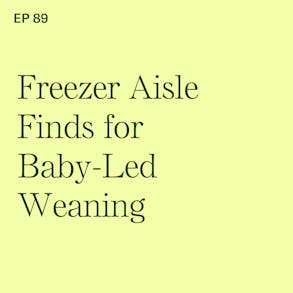
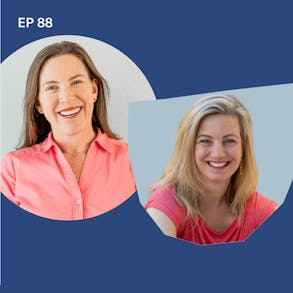
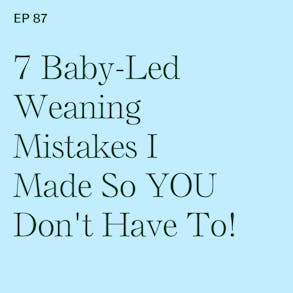
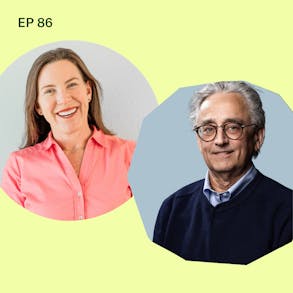
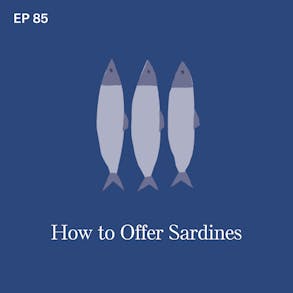
1 (0s):
Are you trying to squeeze the starting solid food stuff into your already busy schedule? Well, I have an all-in-one done for you solution that's going to take the guesswork out of feeding your baby. My online program is called Baby-Led Weaning with Katie Ferraro, contains all of my Baby-Led Weaning training videos, the original a 100 First Foods content library, plus a hundred day meal plan with recipes, like the exact sequence of which foods to feed in which order. So if you wanna stop trying to piece all this feeding stuff together on your own, I would be honored if you would join me inside of the program. You can get signed up at babyledweaning.co/program. Safety is so important when your baby is starting solid foods and there are so many parents out there who are terrified that their baby is going to choke on food. Choking is a rare but real risk and knowing infant CPR can save your baby's life, I recommend that all parents and caregivers take an infant refresher CPR course before they start solid foods.
1 (51s):
This week is Choking Awareness Day and right now, you can get the online CPR course that I recommend and that I take myself each quarter for free when you register for my Choking Prevention and Response Course. The Choking Prevention and Response course, I co-teach this with Dawn Winklemann. She's a speech language pathologist and pediatric swallowing expert and we also teach it alongside Brandon Doerksen, who's a certified CPR specialist. So the three of us created this Choking Prevention and Response Course for parents who are particularly anxious about their baby starting solid foods. If you wanna know everything that's going on with your baby with regards to safe swallowing before you even get started on finger foods, this course is for you and you can get that online CPR course for free when you register for the Choking Prevention and Response Course now through April 1st.
1 (1m 37s):
To get started, go to this website, it's bit.ly/cprchoking. That's bit.ly/cprchoking You don't need any code if you sign up for Choking Prevention and Response anytime now through April 1st, it'll automatically add lifetime access to that online CPR course so you can get over your fear of choking and help your baby make that safe transition to solid foods.
2 (2m 4s):
Sesame could be used as a oil in a flavor matrix in a product. You could have sesame, ground sesame seed or other sesame ingredients in flavors and spices within food products and they didn't have to be labeled. So now there's an added level of protection for those that have sesame allergy by all of those ingredients have had to been pulled out of the generic grouping for flavors and spices in food labeling.
1 (2m 36s):
Hey there, I'm Katie Ferraro, Registered Dietitian, college nutrition professor and mom of seven specializing in Baby-Led Weaning. Here on the Baby-led Weaning with Katie Ferraro Podcast, I help you strip out all of the noise and nonsense about feeding, giving you the confidence and knowledge you need to give your baby a safe start to solid foods using Baby-Led Weaning. Right after choking, the biggest barrier that holds parents back from trying new foods is the fear of allergenic reactions. And while the only way to know if your baby is allergic to a food is to actually introduce that food to them, it can be super confusing to know the best way to do this.
1 (3m 19s):
And things have changed a lot when it comes to guidance about Introducing allergenic foods to babies. Let's say, hypothetically, you had a baby more than 20 years ago, you would likely have been advised by your pediatrician that the committee on nutrition at that time advised that parents should avoid feeding babies dairy foods until one year of age, eggs until two years of age and no peanuts, tree nuts or fish until three years of age. And guess what? None of that was based on any actual research. We know a ton more about food allergies today, not everything of course, but new research and updated guidelines all point to early Introduction of allergenic foods as the best way to lower your baby's risk at food allergy down the road.
1 (3m 60s):
In fact, early Introduction is the only thing that you can do to help lower your baby's risk at food allergy. But again, how to do that safely? Super confusing. So my guest today is working to help change that. His name is Bob Earl. Bob is the Vice President of Regulatory Affairs for FARE. They're the Food Allergy Research and Education, the group that's online at foodallergy.org. Bob is also a dietitian with a deep knowledge of pediatric food allergies, he works in the area at food allergy labeling with the FDA, he does a lot of oversight of potentially allergenic food provision in the WIC program as well as National School Lunch Programs. And there's been a lot of buzz lately about sesame. So Sesame is the ninth allergenic food that was most recently added to the list that's now known as the top nine.
1 (4m 41s):
So those are the nine foods that account for about 90% at food allergy. And it's been confusing because manufacturers are saying that their products "may contain sesame", when they actually don't have sesame. So Bob is gonna help us get to the bottom of that. 'Cause I think that this has been a really confusing situation for consumers and for food allergy advocates. So before we dive into the episode, take a quick second. Please subscribe to this podcast if you're not already doing that 'cause I want both of the weekly episodes that I release to show up in your feed. I do a mini Baby-Led Weaning training episode every Monday and then a longer feeding expert interview each Thursday. So please subscribe if you've got a friend who's starting solid foods too or a family member who's confused about some of this baby feeding stuff, please tell them about the show because your word of mouth recommendations mean everything to me.
1 (5m 25s):
So with no further ado, I want to bring on Bob Earl from FARE at foodAllergy.org. He's gonna give us a total update on what we need to know about food allergies, including reading labels, some really exciting research that's just beyond the horizon. And then gonna help us figure out this little sesame labeling situation. Here's Bob.
2 (5m 50s):
Katie, one of the things that's just really been amazing throughout my career has been the amount of time I've been able to spend and devote on food allergy as an issue. It's a huge passion of mine. While I don't have food allergy and I have friends with kids with food allergy, it's always been very important and very top of mind. But back when I started over 25 years ago working on food allergy, the advice was avoid, avoid, avoid. And now it thrills me to know and that we talk about early introduction of food allergens, eat many of them, eat them often. And now it has been proven to reduce the risk of developing food allergy.
2 (6m 35s):
So what I really am most excited about is the fact that with early Introduction of food allergens, we could eliminate food allergy within a generation or drastically reduce it.
1 (6m 46s):
Well I am kind of mirroring what you say, but I remember when I was in, you know, learning to become a registered dietitian and doing my undergraduate work, we used to learn like the party line was, Committee on Nutrition said infants should stay away from dairy foods until one year of age, eggs until two, and peanuts tree nuts and fish until three years. And you And I were chatting before the interview that like that was just like it was fabricated. It wasn't based on any research on any, you know, peer reviewed publications or standardized guidelines. It was like we just didn't know. And things have changed, as you said, like in literally in one generation we know so much more about preventing food allergy. And I know a lot of what FARE does is really just awareness about food allergy.
1 (7m 30s):
But I think parents don't realize how powerful of a role they play in helping to prevent food allergy. Could you talk a little bit about that? 'cause our parents listening are primarily caregivers and parents of babies six to twelve months of age maybe don't realize the power that they have with early introduction.
2 (7m 46s):
It's really interesting that a researcher from the United Kingdom had this hypothesis of why we didn't see peanut allergy in the population in Israel. And what it turned out to be is that like we have cheese puffs here, they eat these extruded peanut puffs called Bomba and it's basically similar to a first food, like an oat ring would be in the United States in the infant diet. And so they conducted a controlled experiment with individuals that consumed Bomba puffs and those that didn't.
2 (8m 26s):
And what they found is a dramatic reduction in the development of peanut allergy. And so now there have been other studies beyond the LEAP study that have looked at introducing egg and milk and FARE now is helping sponsor a large study that is looking at introduction between four to six months of age and a year and then continuing on eight different food allergens. And our hope is that we can move well beyond the official recommendations from the National Institute of Allergy and Infectious Diseases that the, with the solid science that supports early introduction of peanut to really dig in and get pediatricians and other internal medicine family physicians, all the healthcare providers that provide guidance when it is time to start introducing complimentary foods to do it with food allergens and do it often and keep it going.
1 (9m 29s):
And I think that's so important because it is frustrating, right? When you're a parent and you're looking and you're you know, looking at the evidence and the research and it's like more information is needed. It's like we have very good evidence for early introduction of peanut. We have decent evidence for introduction of egg and cow's milk. And for the people are like, well what about the rest of 'em? It's like, well there's no known benefit to withholding the introduction of those foods. And I think that's what parents sometimes they'll say, well Katie like I'm just, I'm scared my baby's gonna have an allergic reaction so I'm just not gonna do any of these. And it's really working to change that narrative of like, no, no, no, no, no that's not the answer. We can't just sit by and hope our babies don't get food allergy introducing these potentially allergenic foods early and often appears across the board to lower the risk at food allergy.
1 (10m 9s):
But you need that hard and fast data to back it up. So I'm curious, you know, when, when will those results be published, available or you know, how long is this study?
2 (10m 20s):
So back in 2020 when the most current version of the dietary guidelines for Americans was released, we were thrilled beyond belief that, and I know the exact page number it's page 58, that contains the recommendations on early Introduction of peanut. And so the study that's underway that FARE is helping support that's looking at eight food allergens to introduce beginning around four to six months when complimentary foods and an infant's ready for them. We're hoping that within the next 12 to 24 months that we have the study completed and hopefully then we can just abandon the peanut only and just say introduce food allergens early and often and keep it going and we can do more for children's health than I think we even know yet.
1 (11m 12s):
Hey, we're gonna take a quick break but I'll be right back.
1 (12m 37s):
Okay, now you're talking about the eight but I was gonna ask you about sesame, which is the newest of the potentially allergenic foods to be added to the list. Was it not included in the FARE study. 'Cause that protocol got approved before sesame was added to the list or what's the rationale for doing eight versus nine?
2 (12m 52s):
Actually sesame is in the, in the study.
1 (12m 54s):
Oh it is. So which one's not?
2 (12m 56s):
Fish and shellfish are not in the study.
1 (12m 60s):
So that's nine minus two, wouldn't that be seven?
2 (13m 2s):
That's true but, there are multiple different tree nuts in the study.
1 (13m 5s):
Gotcha. Okay cool. And that's the other other question. Here's like Katie, you know, there's like 76 types of tree nut. Do I need to do them all? Like and again a lot of this is we need more research, we need more data, but parents are like what I need to know like about feeding my baby right now. So I appreciate you working to kind of elucidate some of this. And I'll certainly be looking forward to those studies. We were talking a little bit about history, you know, and how the medical community's understanding of food allergy prevention has changed in the past 20 years. You mentioned, you know LEAP, the LEAP study which shows us that the early introduction of peanuts can help reduce the risk of peanut allergy down the road. But then if you look at some other data, we know that pediatricians are not necessarily like, the message is not trickling down to the baby well checks where there's a lot of things you gotta talk about when you're at a four months check.
1 (13m 52s):
But have you guys considered how you're gonna be introducing peanut? It's not necessarily happening and I'm curious what FARE is doing to help get the message out there more like having the research is one thing but having the parents hear it from their doctor like oh I gotta be doing this and then how do I do it safely? That's another thing. Where are you guys on that?
2 (14m 9s):
Great question, Katie. We've done a whole lot on this topic and we continue to do more. It's absolutely critical. It's again, we're breaking old habits that are 20 years old or more of changing from avoid-avoid to introduce early. So FARE has with joining forces with food allergists, pediatricians, we have a prevention initiative that FARE has started on early introduction of peanut and we also have developed for lay health caregivers, let's say like dietitians like you and me that work in the WIC program, that can, we have a module that is four pieces that talks about the basics of food allergy, how to identify it, how to work on management of it and the final section is on promoting early introduction but old habits die hard.
1 (15m 7s):
Yeah.
2 (15m 7s):
But so it's gonna take a long time to get individuals, you know that physicians that rightly so or even maybe you and I as dietitians trained back when it was the norm to avoid.
1 (15m 19s):
But we still have, there are parents who come into our program and like my doctor told me not to feed egg white until age one. And I was like, what should I do? I was like, you should get a new pediatrician because that advice is more than 20 years old. Like we know with the eat study that the early Introduction of eggs, you wanna introduce that protein early and often. And then telling parents to wait, you're scaring them. And there's no rationale, there's no reasoning, there's no data to support waiting. And you're right, we're changing the entire mindset from a avoid to avoid to early Introduction in one generation. But if the healthcare practitioners aren't on board and hearing the message, it's not gonna get out there to the parents.
2 (15m 53s):
You're absolutely correct and it's what we need to do and it's not gonna happen overnight, but we're trying to accelerate it. The allergist community, the two biggest organizations that represent food allergists in the United States have a joint statement out that their guidelines are to feed egg and peanut. And we want not only everyone, we have to look at this across the population. We wanna make sure that both those that have health insurance see pediatricians for well infant visits and those that participate in programs like WIC and Medicaid, that the word has to get out 'cause we, this can't be of those that have and have not issue.
1 (16m 42s):
I am 100% agree with you.
2 (16m 46s):
The information across the board to the underserved communities in the United States and encourage all caregivers to be talking about early Introduction.
1 (16m 54s):
And if I may, not that you're looking for suggestions, but as a dietitian who does a lot of work with the state WIC associations and working on modernizing infant feeding curriculum, it's all good and well to talk about the importance of this. But the WIC food package does not provide a peanut food for infants. There is no peanut in the six to twelve month package. And so, and think how long it took to get juice reduced in the WIC package for God's sakes, like these things in our professional generation will probably not happen. But education is key. I think it's good that WIC is talking about this because half of all babies born in this country are in the WIC program like this. This is 50% of the babies not getting the actual peanut foods that they need to safely introduce peanut to their baby because we can't do sticky globs of peanut butter as a choking hazard.
1 (17m 38s):
We can't do the thick globs of nut butter but there are ways to make peanuts safe. And I think that's where, you know, dietitians were, we're putting this episode out in National Nutrition Month and celebrating the work that dietitians do. There's a lot of work that still needs to be done and of course WIC is a supplemental nutrition program. The understanding is not that a 100% of the food that the baby eats comes from the program, but for God's sakes we have so much data about the importance of this allergenic food. Why can't it be in the food package? And you know, maybe when we're dead and gone it will be.
2 (18m 5s):
It's a conundrum and we'll see what happens when the final rule comes out in the next several months. We have continuously educated WIC staff and advocated for peanut to be included in the infant food packages. And you are right that half of the infants born in the United States are on the WIC program and/or participate in Medicaid. And so we'd love to have both programs support early introduction of food allergens and we're working and having dialogue. But then with Medicaid, it's a state by state by state discussion that has to be had.
2 (18m 50s):
The other piece that's really important on WIC is that the food packages for children and mothers need to have better substitutions for, for those that have food allergy. So you want to be able to maybe handle the substitutions and not be so rigorous in the structure of the foods that are in the food package to be able to accommodate, to ensure that you're really delivering the right nutrition to those that already exist and have food allergy.
1 (19m 23s):
I wanna switch gears and ask about sesame. So sesame is the most recent add to the list of major potential allergenic foods that used to be the big eight, now it's nine foods. Tell me a little bit from a historical standpoint, what changed that caused sesame to elevate in importance or why was it added to the list? Does it have to do with sesame allergy being on the rise or the United States just finally catching up to what other countries have been doing? What's the history there?
2 (19m 46s):
Well there are over a 1.6 million individuals in the United States that have sesame allergy and with other food allergens, we've been seeing a rise over the last decade rather than what we can do now to hopefully turn it around. So our initiative was to get sesame as the ninth allergen, but as you know, we're behind on the total number of allergens requiring labeling in the United States. Canada has, has had sesame for a decade or more before the United States. They also have mustard and molluscan shellfish, like clams and oysters and such.
2 (20m 27s):
The European Union has an even broader list and there are different lists in Australia, New Zealand. We'd like to see it catch up. One of the barriers to this has been that the original list of eight was defined by the law, the Food Allergen Labeling and Consumer Protection Act that was passed in 2004. So now we have the ninth allergen. One of the things in the FASTER act that added sesame as allergen number nine requiring labeling was it required FDA to develop a regulatory approach for the addition of new allergens. But let me turn and talk a little bit more about sesame and some of the benefits of why sesame was a good addition and what are some of the issues that there may be some misconceptions with your viewers about.
2 (21m 19s):
So when sesame could be used as a oil in a flavor matrix in a product, you could have sesame ground sesame seed or other sesame ingredients in flavors and spices within food products. And they didn't have to be labeled. So now there's an added level of protection for those that have sesame allergy by all of those ingredients have had to been pulled out of the generic grouping for flavors and spices in food labeling and that leaves gives more disclosure in ingredient labeling and in contains statements that we see on the label.
2 (22m 2s):
The one downside to it is what we have seen in the US baking sector where bakers that produce both sesame seeded products as well as plain products, have actually chosen to be safe to lower their risk of having a recall, to adding intentionally sesame flour in their plain bakery products. Which has really greatly limited the choices out there for our community that has sesame allergy.
1 (22m 33s):
And just to clarify, they're doing that so that they're in compliance with the statements instead of, 'cause you, you can't say you're producing sesame free bun if you also produce it in a sesame containing facility. Is that correct?
2 (22m 47s):
Well there are controls that could be put in place in facilities that make both types of buns. You could have dedicated equipment for baking plain buns and we've seen a huge success where the supplier for breadsticks for the Olive Garden had breadsticks that after the 1st of January of 2023 when the FASTER Act was fully implemented, that the breadsticks then had to provide an advisory through Olive Garden that the breadsticks now contains sesame with the addition of sesame flour. Olive Garden heard loud and clear about it that it was not something that favorites of their restaurants liked and they turned around and they re-bid out to other manufacturers.
2 (23m 38s):
And within the last four months or so, they've been able to have sesame free breadsticks again, which is a great win for our community. And I really applaud a restaurant chain like Olive Garden for using its power to procure foods to do the right thing.
1 (24m 1s):
Hey, we're gonna take a quick break, but I'll be right back. What do you think is the most important message for parents of babies to hear about food allergy prevention? You hear the stories in the news and I think sometimes it's kind of confusing and why do we have different lists and how come my older doctor doesn't talk to me about this stuff?
1 (24m 48s):
As someone who has been working in the food allergy space as a dietitian for over 30 years, what is that takeaway message for parents?
2 (24m 58s):
I think the takeaway is that we need to change the old habits and the old conversation. And just as you think that it's time to give a child applesauce, oatmeal, oat rings and those types of things, carrot puree and other vegetable purees that you, it is just standard that you feed the biggest variety of complimentary foods possible, including food allergens and not to worry about it because it is shown to be effective with very sound signs.
1 (25m 37s):
So Bob, what information and/or education can FARE provide for families who are interested in learning more about food allergy prevention and then where's the place like that they go to learn more ?
2 (25m 47s):
Well FARE has huge amounts of information. I mentioned earlier in our discussion that we have our prevention initiative that would be a place where parents could take that information to their doctor and say, "Hey, this is what we need to be doing now". Also we have a Food Allergy Ccademy, while that can be for people that are involved in food service or health professionals and Registered dietitians like you and myself, that a lot of that is free and provides great information. So you know others can get the word out, we're at foodallergy.org and please visit us.
1 (26m 23s):
And I will put a plug in for the Registered dietitians who are listening, I took your advanced pediatric food allergy course that Carina Venter and Marion Groetch taught and it was top notch.
2 (26m 34s):
And if you wanna put in another plug is the co-branded FARE and Academy of Nutrition and Dietetics Health Professionals Manual.
1 (26m 41s):
Oh, I have that as well. I have it right here. I reference it all the time. It, it's an amazing manual. Well we will stay tuned. Thank you so much Bob for bringing all of this information and your advocacy and I really appreciate your time and and sharing this with our audience because it is important message and we should hear it from from the authorities. And you guys definitely are over there at FARE.
2 (27m 2s):
Thanks much, Katie. It's been great chatting with you.
1 (27m 6s):
Well I hope you guys enjoyed that interview with Bob Earl from FARE. He is online at foodallergy.org. They're a wealth of information. If you ever have questions about food allergy, start your search at foodallergy.org. I will put all of the resources that Bob mentioned on the show notes for this episode. It's also gonna be in the description below where you're listening to or go online to blwpodcast.com/418. And a special thank you to our partners at AirWave Media. If you guys like podcasts that feature food and science and use in your brain, they've got a lot of good ones over there at AirWave. All of our shows are there too, but we're also online at blwpodcast.com. Thanks so much for listening.
1 (27m 47s):
I'll see you guys next time. Like a lot of moms out there, I will totally admit I am quite Type A. I am a total task master and one of my weekly work tasks is to review the feedback forms that are new students in my program, which is called Baby-Led Weaning with Katie Ferraro that they leave for us. So basically this form asks a lot of questions about you and your baby and your baby's feeding and medical history, any concerns that you might have or fears about starting solid foods. And all of this data helps me when I'm answering parent questions inside of our weekly live office hours so I can then tailor my response to your particular baby and situation, right? Because it's not a one size fits all approach when it comes to what your baby's eating, right?
1 (28m 27s):
Because maybe your baby has an egg allergy or another mom in the program she might really be struggling with how to make meat safe 'cause she doesn't like to cook. So this week on the form, there's a new mom named Janine and she wrote, and this is her, "I researched a lot on the internet, And I have a lot of books. I saw a lot of other Baby-Led Weaning programs. But in the end, this is the one that I realized is what I'm really looking for as a new mom. I love that Katie's program has a community and that there are videos for everything you need to know and how to make the foods. And what I love the most is that there's already a meal plan ready". And this just like stopped my heart because this is exactly why I created the Baby-Led Weaning with Katie Ferraro program.
1 (29m 9s):
I wanted to literally put everything that you need to know about starting solid foods safely in one place with a super easy to follow 20 full weeks meal plan. Okay, there's 20 weeks 'cause it's five foods a week. I want your baby to get to those a hundred new foods before they turn one. 'cause I also know you have a lot going on as a new mom and hunting and pecking all over the internet to try to figure out what am I gonna feed this baby that is not the solution. So if you want to check out the Baby-Led Weaning with Katie Ferraro program, I would be honored to work with you and your baby. You can head to babyledweaning.co to get started and hopefully I'll be reading your feedback soon too.

The Program Baby-Led Weaning with Katie Ferraro
A step-by-step digital program for starting solid foods safely and navigating the original 100 FIRST FOODS™ meal plan with baby-led weaning.
 EXPERT-LED, PROVEN APPROACH TO EATING REAL FOOD
EXPERT-LED, PROVEN APPROACH TO EATING REAL FOOD CONCISE VIDEO TRAININGS TO MASTER BABY-LED WEANING
CONCISE VIDEO TRAININGS TO MASTER BABY-LED WEANING 100 FIRST FOODS DAILY MEAL PLAN WITH FOOD PREP VIDEOS
100 FIRST FOODS DAILY MEAL PLAN WITH FOOD PREP VIDEOS
Baby-Led Weaning for Beginners Free Workshop
Is your baby ready to start solid foods, but you’re not sure where to start? Get ready to give your baby a solid foundation to a lifetime of loving real food…even if you’re feeling overwhelmed or confused about this next stage of infant feeding.
Get baby-led weaning recipes and tips delivered to your email inbox.

